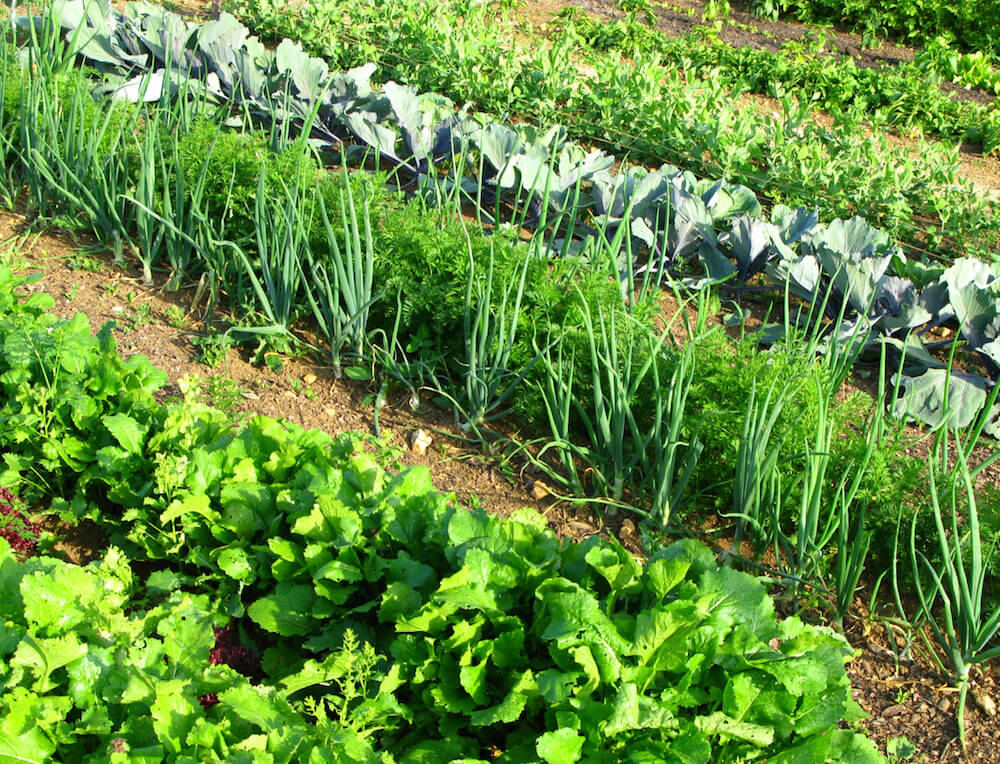Onions are a staple flavorful ingredient to cook with. Raw onions can be added to salads, bread, soups, or casseroles. Onions also offer a range of health benefits like boosting your immune system, regulating blood sugar levels, and controling cholesterol levels.
Onions are easy to grow and incorporated into the garden. When planted near certain plants as in the method of companion planting, it can improve the yield, longevity, quality, resistance to pests, and growth of your garden.
Companion Planting
Companion planting is a practice that enriches and protects vulnerable crops by planting specific crops near another to deter pests, attract beneficial insects, and stimulate growth. It also improves soil nutrients, encourages good crop yield, better taste, and provides ground cover.
Overall, companion planting promotes a healthier garden and reduces the amount of labor as a bonus.
Read on to know the best and worst onion companion plants and take away some useful gardening tips.
Companion Planting Guide for Onions
Onions are a good companion for many other plants. Onions as companion plants have the ability to improve the flavor of its companions, deter common garden pests, and also attract beneficial insects to your garden.
Here are the common crops, vegetables, flowers, and herb companion plants to onions for your garden.
Cabbage Family
Onion repels insect pests like cabbage worms, cabbage loopers, Japanese beetles, and cabbage maggots. Brocolli, kale, cauliflower, turnips, kohlrabi, and Brussels sprouts are all brassica or members of the cabbage family vegetables that benefit from being planted next to onions.
In addition, the smell of onions can also keep rabbits from seeking out the scent of leafy greens to enjoy like cabbage.
Lettuce
Planting a vegetable garden of lettuce near onions maximizes space in the garden without competing for resources. Onions as a root crop use the underground space to grow while lettuce plants have considerably shallow roots and grow above the soil.
Chamomile
Chamomile not only has antibacterial and antifungal properties, it also helps improve the flavor of onions when planted in close proximity. In addition, it can attract benefidical pollinators to the garden.
Summer savory
Summer savory encourages the growth of onions and makes them taste sweeter and have overall better flavor.
Carrots
Onion helps repel carrot fly which is a common carrot pest. Plant carrots near onions with plenty of space for best results.
At the same time, the smell of carrots help deter onion fly from the onions making them good companions overall.
Garlic
Garlic has strong smells that deters aphids, ermine moths, and Japanese beetles. However, it is best to not plant them in close proximity because they tend to attract onion maggots. Planting them too close together will mean that the onion maggots can travel easily from one plant to another.
Leeks
Leeks come from the same onion family and so they have the same environmental and nutrient needs. Leeks can be an effective way to confuse onion flies. Similar to garlic, Leeks also attract onion maggots so it is best to scatter them in the garden.
Beets
Beets in general make good companion plants for onions, garlic, leeks, and plants in the cabbage family including broccoli. Onions protect beets from aphids, borers, cabbage maggots, mites, slugs, cutworms, sugar beet-flea beetles, and maggots of all types. Plant onions as a companion plant to beets to keep mammal pests away, like rabbits and deer.
Strawberries
Strawberries provide shade across the soil to give onions their preferred cool climate. Strawberries interplanted with onions protect strawberries from aphids, slugs, and snails. Mature onions produce a smell masking the strawberry’s sweet scent from pests.
Tomatoes
Onions give a similar effect to tomatoes. The onion smell repels tomato pests especially aphids, a common tomato pest making them good companions to tomato plants.
Swiss chard
Swiss chard function as ground cover or living mulch, keeping the soil moist, making it a good environment for onions to grow.
Marigolds
The pungent smell of marigolds attracts beneficial insects that can both pollinate and feed on various pests that can plague your garden.
Herbs
Having dill, parsley, and mint as companions to onion helps keep onion flies away. The herb family scent confuse pests that like to breed in onion leaves. Onion fly maggots will also feed on the onion bulbs affecting your yield.
What should not be planted next to onions?
On the opposite end, it is best to avoid planting onions beside certain plants like:
Peas, Beans, Sage, and Asparagus
Onions are believed to stunt the growth of beans, peas, and asparagus. Onions are believed to secrete substances by their roots and can be absorbed by other plants. It is believed to influence the taste turning them sour or bitter.
Onions have also been found to kill beneficial nitrogen-fixing bacteria on the root nodes of bush beans and peas. These beneficial bacteria bring back nitrogen from the atmosphere into the soil for plants to use. Without these, the plants do not receive enough nitrogen for proper growth.
